Over the past two decades, the internet and smartphones have transformed where, when and how people meet potential romantic partners. But, as many aspects of dating have migrated online, how do online daters themselves feel about their time spent using these platforms?
Overall, online daters are more likely to rate their experiences in positive rather than negative terms, and majorities of these users say that it is was easy to find others who shared their interests or wanted to meet in person. But users also describe a more troubling and frustrating side of online dating, including their own encounters with harassing behaviors on these platforms.
Roughly six-in-ten online daters say they have had an overall positive experience with these platforms
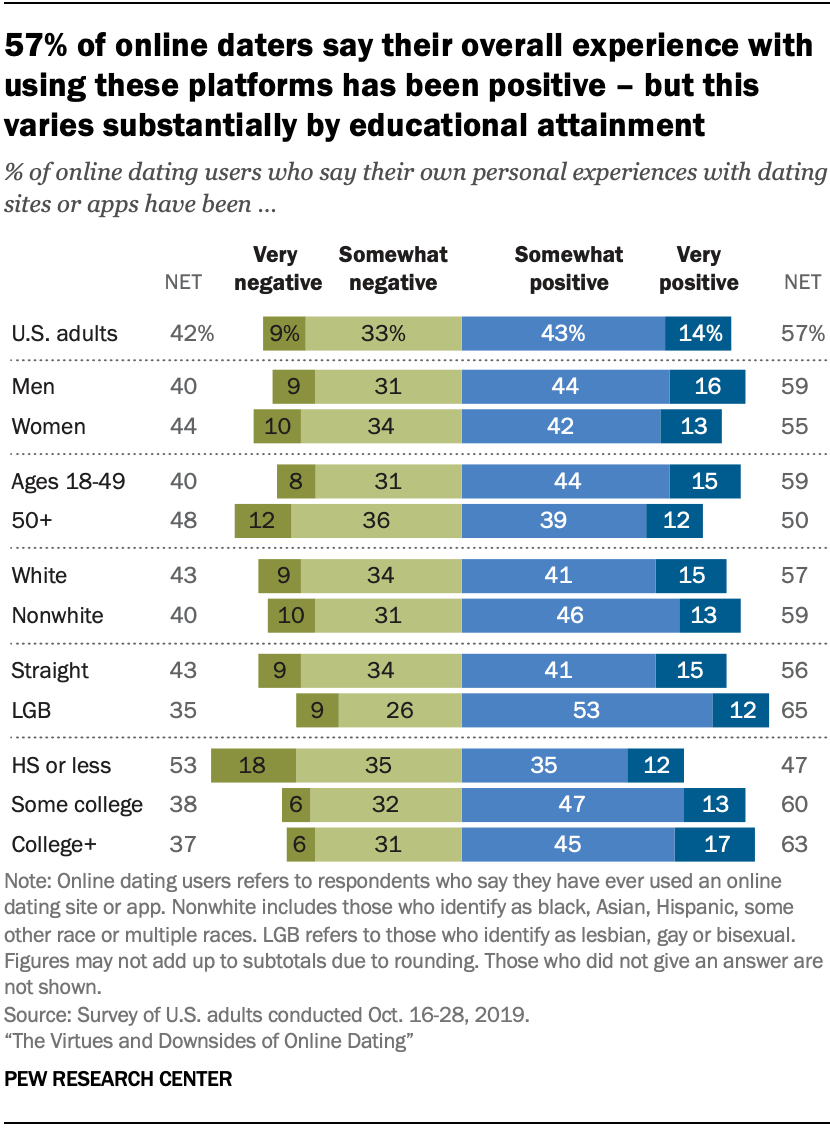 Some 57% of Americans who have ever used an online dating site or app say their own personal experiences with these platforms have been very (14%) or somewhat (43%) positive. Smaller shares of users – though still about four-in-ten – describe their time with online dating as at least somewhat negative, including 9% who say it was a very negative.
Some 57% of Americans who have ever used an online dating site or app say their own personal experiences with these platforms have been very (14%) or somewhat (43%) positive. Smaller shares of users – though still about four-in-ten – describe their time with online dating as at least somewhat negative, including 9% who say it was a very negative.
The way people assess their online dating experiences varies widely by socioeconomic factors. Fully 63% of online daters with a bachelor’s or advanced degree say their experience has been very or somewhat positive, compared with 47% among those who have a high school diploma or less. A similar pattern ties to users’ income: Online dating users whose annual family income is $75,000 or more a year are far more likely than those whose yearly family income falls below $30,000 to describe their experience as at least somewhat positive (70% vs. 44%).
By comparison, there are more modest differences by sexual orientation or age. LGB users are more likely than straight users to describe their own experience with dating sites or apps as very or somewhat positive (65% vs. 56%), while users ages 18 to 49 are more likely than those ages 50 and older to say their online dating experience has been at least somewhat positive (59% vs. 50%). By contrast, the way online daters rate their overall experience does not statistically vary by gender or race and ethnicity.
Current or recent users of these platforms say online dating leaves them feeling more frustrated than hopeful
Online dating often requires individuals to make themselves noticeable in a large pool of other daters who either accept or reject them based on quick assessments. For some, this fast-paced approach to dating may have a positive impact on their outlook and self-esteem, while others may feel more dispirited.
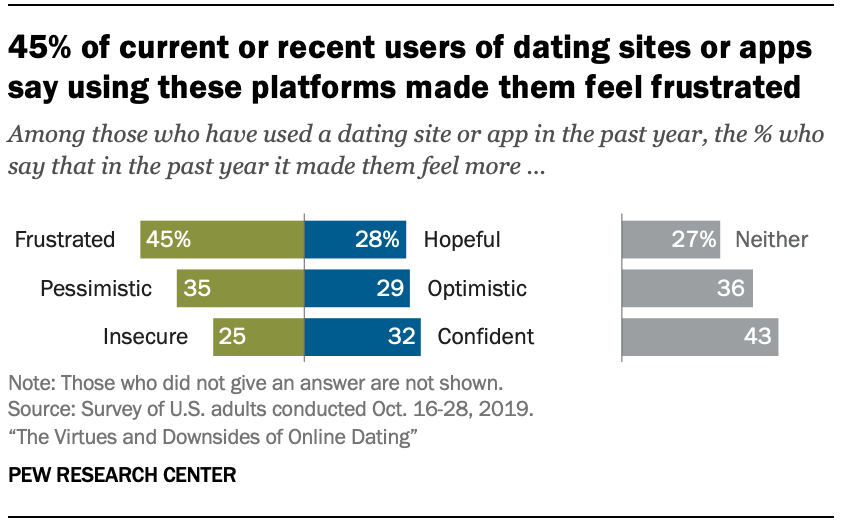 To better understand users’ experiences, the survey presented those who have used online dating sites or apps within the past year with three pairs of words and asked them to choose the sentiment that most closely matched how they felt when using these platforms. Larger shares of Americans who are currently using dating sites or apps or who have done so in the past year say the experience left them feeling more frustrated (45%) than hopeful (28%). Another 27% of these users say they felt neither hopeful nor frustrated.
To better understand users’ experiences, the survey presented those who have used online dating sites or apps within the past year with three pairs of words and asked them to choose the sentiment that most closely matched how they felt when using these platforms. Larger shares of Americans who are currently using dating sites or apps or who have done so in the past year say the experience left them feeling more frustrated (45%) than hopeful (28%). Another 27% of these users say they felt neither hopeful nor frustrated.
Other sentiments are more evenly balanced between positive and negative feelings. Some 35% of current or recent users say that in the past year online dating has made them feel more pessimistic, while 29% say these platforms left them feeling more optimistic. At the same time, 32% of current or recent online daters report that in the past year, dating sites or apps made them feel more confident, while 25% say dating sites or apps made them feel more insecure. Still, for each of these pairs of words, nearly four-in-ten or more of these users say that neither of the emotions offered reflects how they felt when using a dating site or app in the past year.
Online dating users across most demographic groups report similar emotions while using these platforms, but there are some differences by race and ethnicity. Among those who have used a dating site or app in the past year, white users are more likely than nonwhite users to say that these platforms have made them feel more frustrated (53% vs. 36%) or more pessimistic (40% vs. 29%).5
Majorities of online dating users found it easy to come across others who shared their interests or were looking for the same kind of relationship
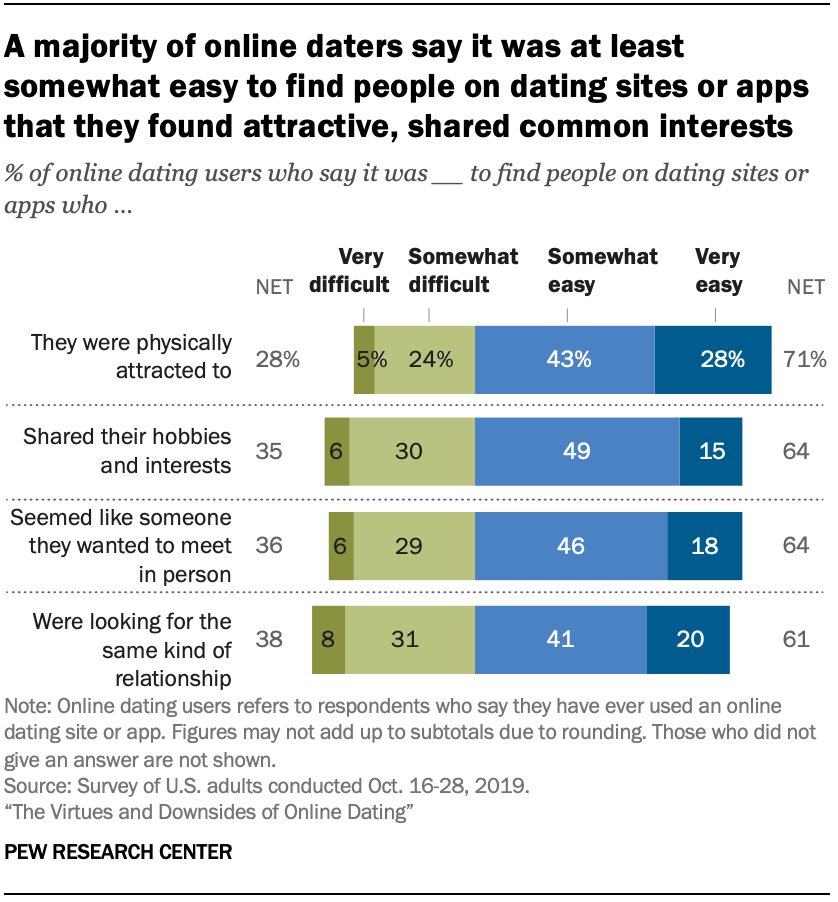 There have been numerous accounts detailing some of the struggles of online dating – including the difficulty that users may encounter when trying to find someone compatible. Overall, online daters are more likely to say that finding desirable or like-minded people was an easy rather than difficult endeavor, but there are some groups who find these aspects of online dating more daunting.
There have been numerous accounts detailing some of the struggles of online dating – including the difficulty that users may encounter when trying to find someone compatible. Overall, online daters are more likely to say that finding desirable or like-minded people was an easy rather than difficult endeavor, but there are some groups who find these aspects of online dating more daunting.
Fully 71% of Americans who have ever used a dating site or app say it was at least somewhat easy to find people on these platforms that they were physically attracted to, including 28% who say that this was a very easy task for them. A majority of online daters also said it was very or somewhat easy to find people who shared their hobbies and interests (64%), seemed like someone they would want to meet in person (64%) or were looking for the same kind of relationship as them (61%).
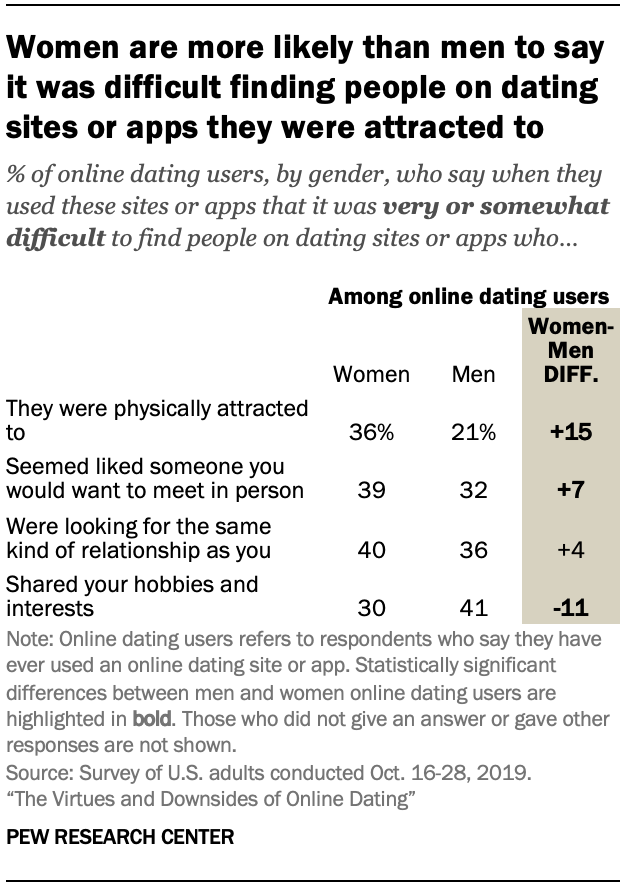 Online daters’ assessments of how hard or easy it was to find compatible users varies by gender. Women who have ever used a dating site or app are more likely than men to say they have found it very or somewhat difficult to find people that they were physical attracted to (36% vs. 21%) or seemed like someone they would want to meet in person (39% vs. 32%). On the other hand, 41% of male users say they found it at least somewhat difficult to find people who shared their hobbies and interests, compared with three-in-ten female users.
Online daters’ assessments of how hard or easy it was to find compatible users varies by gender. Women who have ever used a dating site or app are more likely than men to say they have found it very or somewhat difficult to find people that they were physical attracted to (36% vs. 21%) or seemed like someone they would want to meet in person (39% vs. 32%). On the other hand, 41% of male users say they found it at least somewhat difficult to find people who shared their hobbies and interests, compared with three-in-ten female users.
There are some educational differences as well. Online daters who have a high school education or less, for example, are more likely than those with a bachelor’s or advanced degree to say that it was very or somewhat difficult to find people who were looking for the same kind of relationship as them (45% vs. 32%) or who shared their hobbies or interests (39% vs. 30%).
Men and women who have used online dating in the past five years have contrasting experiences with the amount of messages they received
When asked if they received too many, too few or just about the right amount of messages, 43% of Americans who have used an online dating site or app in the past five years say they did not receive enough messages, 40% think the amount was just about right, and fewer – 17% – say they received too many messages.
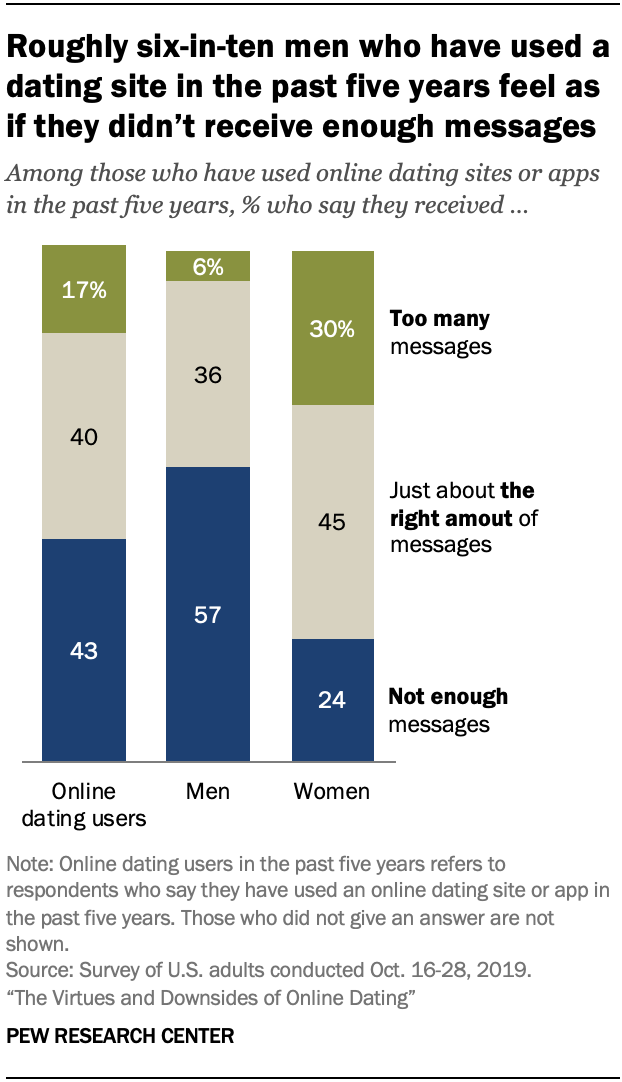 But there are stark gender differences in the amount of attention users report receiving. Some 57% of men who have online dated in the past five years report that they did not receive enough messages, while just 6% state they received too many messages. By contrast, women who have used dating sites or apps in this time period are five times as likely as men to report they were sent too many messages (30% vs. 6%) and are far less likely than men to say they did not receive enough messages (24% express this view).
But there are stark gender differences in the amount of attention users report receiving. Some 57% of men who have online dated in the past five years report that they did not receive enough messages, while just 6% state they received too many messages. By contrast, women who have used dating sites or apps in this time period are five times as likely as men to report they were sent too many messages (30% vs. 6%) and are far less likely than men to say they did not receive enough messages (24% express this view).
The survey also asked online daters about their experiences with getting messages from people they were interested in. Similarly, these users are more likely to report receiving too few rather than too many of these messages (54% vs. 13%). And while gender differences remain, they are less pronounced. For example, 61% of men who have online dated in the past five years say they did not receive enough messages from people they were interested in, compared with 44% of women who say this.
Online daters place a high level of importance on seeing other users’ photos, finding out the kind of relationship they’re interested in
Online dating allows users to quickly evaluate dozens of potential partners and scour profiles for all kinds of information – from the way someone looks to how they spend their free time and even their political leanings. But what are the most important things people look for as they scroll or swipe through profiles?
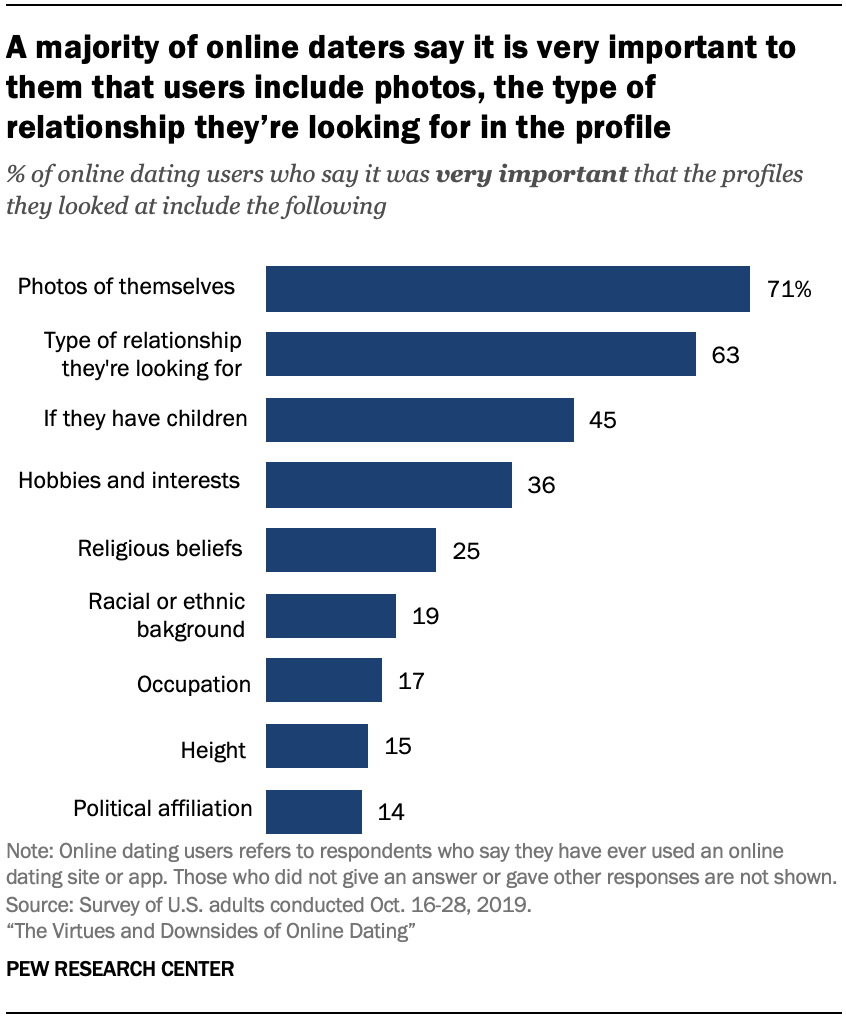 Online daters find it especially important to be able to view someone’s photo. Fully 71% of users say it was very important to them that the profiles they looked at included the other user’s photo.
Online daters find it especially important to be able to view someone’s photo. Fully 71% of users say it was very important to them that the profiles they looked at included the other user’s photo.
A majority of online dating users also felt it was necessary to gauge other users’ intentions: 63% say it was very important that the profiles they looked through included the type of relationship the other person was looking for.
Additionally, 45% of users say it was very important that profiles included whether the person had any children; 36% say this about hobbies and interests; and 25% feel this way about religious beliefs.
Smaller shares of users consider a person’s racial or ethnic background, occupation, height or political affiliation to be very important information to discover when looking through online dating profiles.
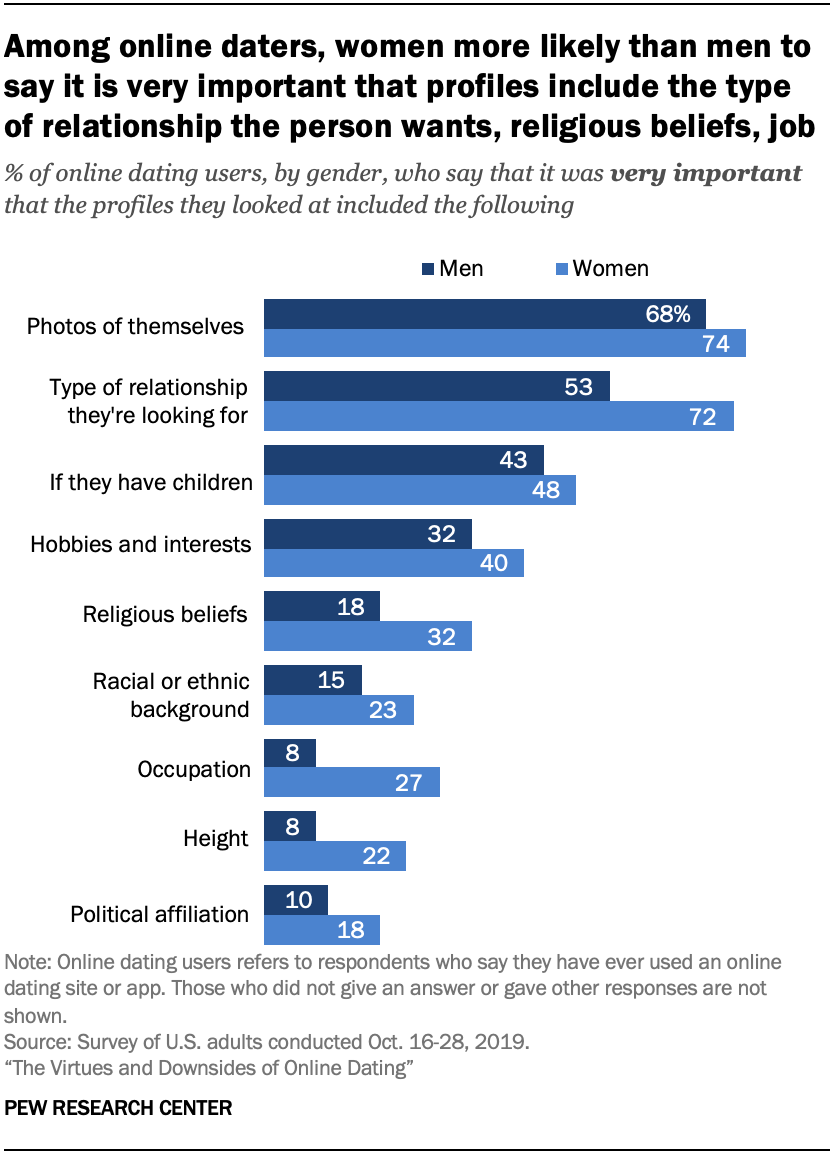 Across several measures, women are more likely than men to describe certain information as essential to glean from someone’s profile. Roughly seven-in-ten female users (72%) say that it was very important to them that the profiles they looked at included the type of relationship the person was looking for, while about half of male users say this (53%). Among online daters, women also are more likely than men to say that it was very important to them that the profiles included a person’s religious beliefs (32% vs. 18%), occupation (27% vs. 8%) or height (22% vs. 8%).
Across several measures, women are more likely than men to describe certain information as essential to glean from someone’s profile. Roughly seven-in-ten female users (72%) say that it was very important to them that the profiles they looked at included the type of relationship the person was looking for, while about half of male users say this (53%). Among online daters, women also are more likely than men to say that it was very important to them that the profiles included a person’s religious beliefs (32% vs. 18%), occupation (27% vs. 8%) or height (22% vs. 8%).
Other gender differences – such as the importance of users including in their profiles hobbies and interests, racial or ethnic background, or political affiliation – are more modest.
The level of importance that users place on certain content also varies by age. Online dating users ages 50 and older are more likely than users ages 18 to 49 to say that it is very important that the profiles they looked at included the person’s race or ethnicity (26% vs. 16%) or their political affiliation (21% vs. 12%). Younger users, on the other hand, are more likely than older users to say that it was very important to them that profiles they came across included whether the person had children (48% vs. 37%).
Users of dating sites or apps generally believe embellishment is a very common part of the online dating experience
Even as users of dating sites and apps generally rate their overall experiences positively, they also believe that certain negative behaviors are especially prevalent on these platforms.
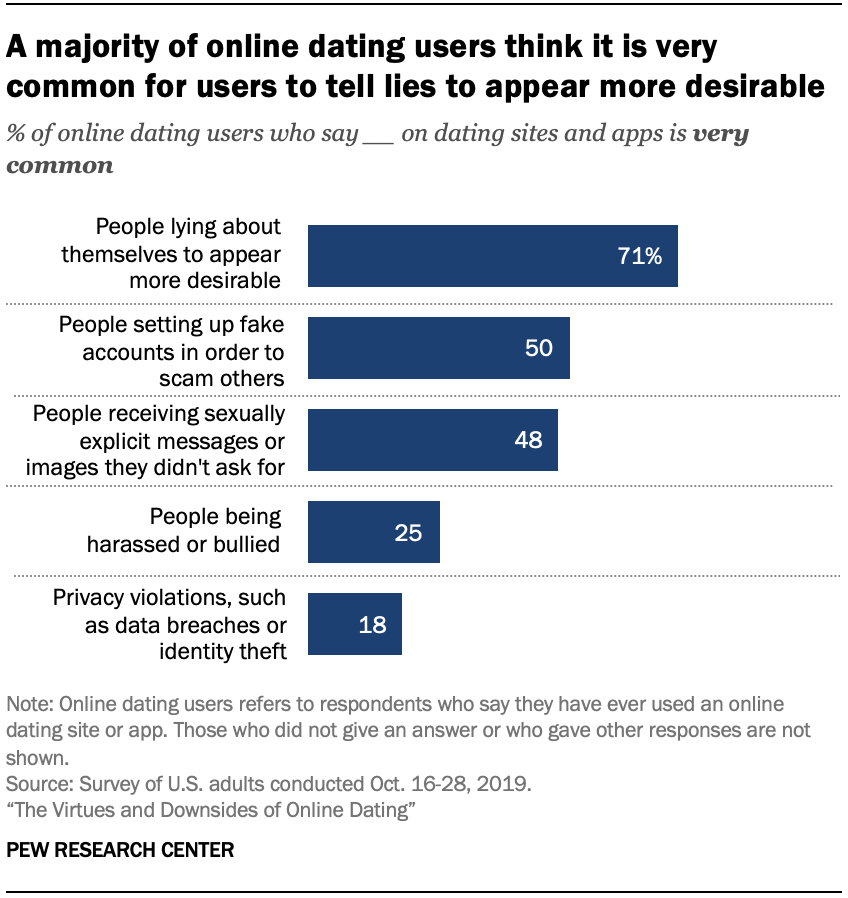 Indeed, a majority of users characterize lying as a prevalent feature of the online dating environment. Fully 71% of adults who have used an online dating site or app say it is very common for people on these platforms to lie about themselves to appear more desirable.
Indeed, a majority of users characterize lying as a prevalent feature of the online dating environment. Fully 71% of adults who have used an online dating site or app say it is very common for people on these platforms to lie about themselves to appear more desirable.
Smaller shares – though still about half of all users – believe that it is very common for people on dating sites and apps to set up fake accounts in order to scam others (50%) or for people to receive sexually explicit messages or images they did not ask for (48%). Fewer users believe that people being harassed or bullied (25%) or data privacy violations (18%) are very common occurrences on online dating sites or apps.
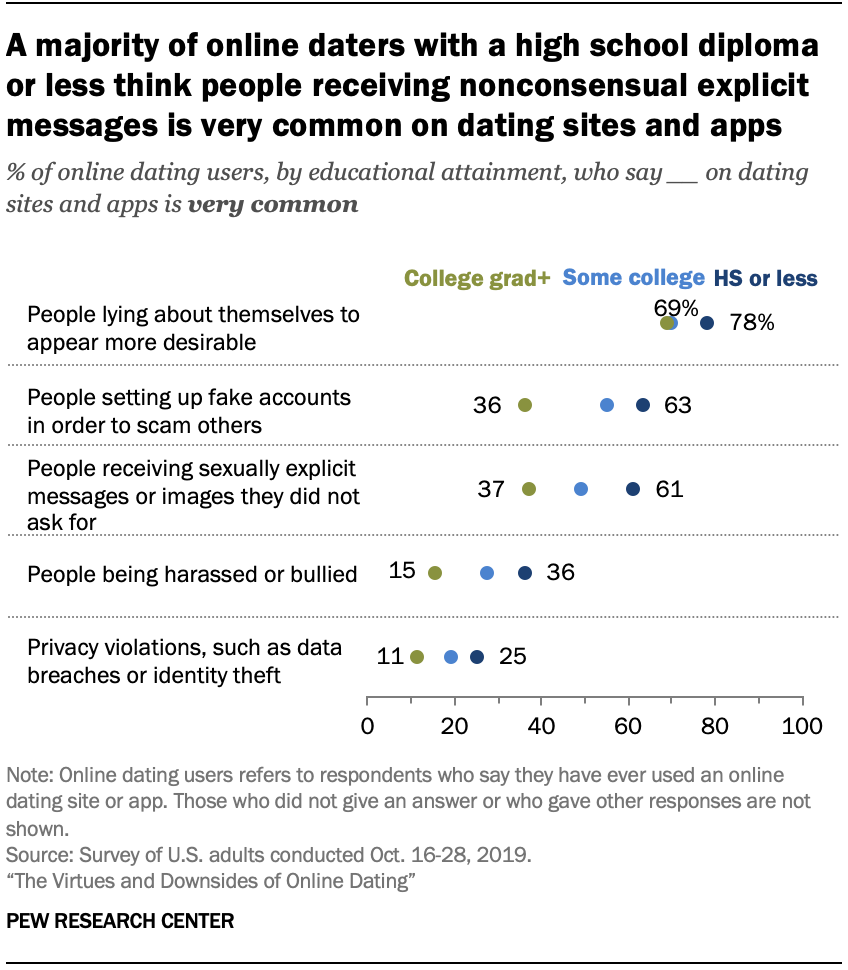 Views about the pervasiveness of certain behaviors on dating platforms varies substantially by educational attainment. For example, 61% of online daters who have a high school diploma or less education say it is very common for people to receive sexually explicit images or messages on dating sites or apps, compared with 49% of those with some college experience and 37% of those who have bachelor’s degree or more education. At the same time, users with a high school education or less are also more likely than those with a college degree to believe that people setting up fake accounts for scams, people being harassed or bullied, or privacy violations are a very common aspect of online dating.
Views about the pervasiveness of certain behaviors on dating platforms varies substantially by educational attainment. For example, 61% of online daters who have a high school diploma or less education say it is very common for people to receive sexually explicit images or messages on dating sites or apps, compared with 49% of those with some college experience and 37% of those who have bachelor’s degree or more education. At the same time, users with a high school education or less are also more likely than those with a college degree to believe that people setting up fake accounts for scams, people being harassed or bullied, or privacy violations are a very common aspect of online dating.
Men and women also hold somewhat differing views on the prevalence of these issues. Some 57% of women say that people setting up fake accounts in order to scam others is very common, compared with 44% of men who say this. And while about one-in-three female users (32%) think harassment is a very common occurrence on online dating platforms, that share falls to 19% among male users. Among online daters, women are also more likely than men to say it is very common for people on dating sites and apps to lie about themselves to appear more desirable (76% vs. 67%), receive sexually explicit messages or images they didn’t ask for (55% vs. 42%) or for privacy violations to occur (22% vs. 14%).
There also are large differences by age when respondents are asked about the prevalence of nonconsensual sexual messages: 56% of online dating users ages 18 to 49 say this is very common on these platforms, compared with just 27% of users ages 50 and older who say this.
Younger women are especially likely to be the target of harassing behaviors when using these platforms
Online harassment has become a regular feature of life on the internet, from social media sites to comments sections – and dating platforms.
This survey finds that online daters encounter a range of negative behaviors while using these platforms. Some 37% of online dating users say someone on a dating site or app has continued to contact them after they said they weren’t interested, while 28% say they have been called an offensive name while using these platforms. About one-in-ten users (9%) also say that someone on a dating site or app has threatened to physically harm them.
Other negative encounters are more sexualized: 35% of users say someone on a dating site or app has sent them a sexually explicit message or image they did not ask for.
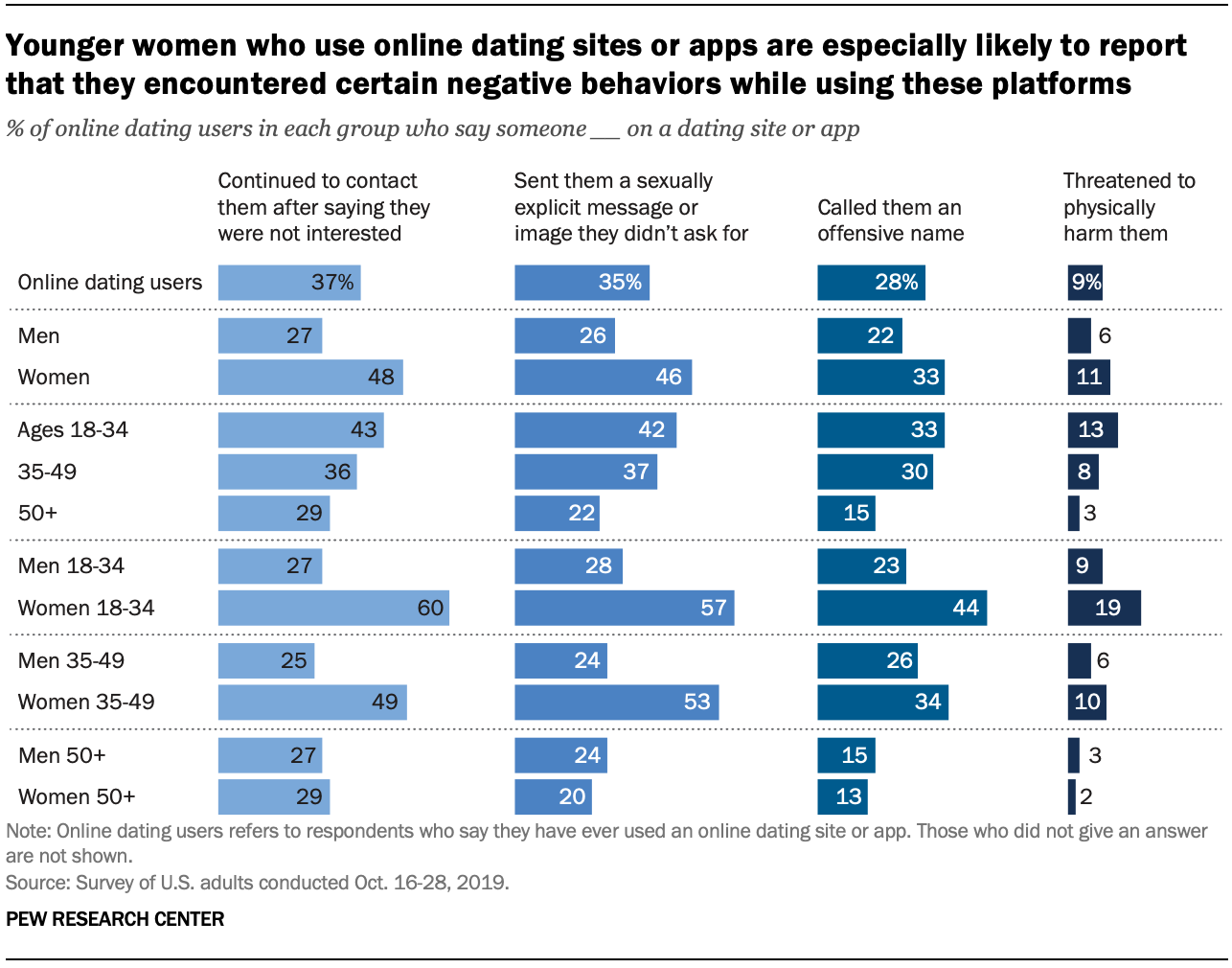
These unpleasant interactions are more prevalent among women than men – with the largest gender gaps present among those who say they have received unwanted contact or explicit messages. Some 48% of female users say someone has continued to contact them after they said they were not interested, while a similar share – 46% – report that they have been sent a sexually explicit message or image they didn’t ask for. These shares are considerably lower among male users (27% and 26%, respectively). Similar gender gaps are present when online dating users are asked about being called an offensive name or having someone threaten to physically harm them.
Younger women, in particular, stand out for how likely they are to encounter these behaviors on a dating platform. Six-in-ten female users ages 18 to 34 say someone through a dating site or app continued to contact them after they said they were not interested, while 57% say they have been sent a sexually explicit message or image that they did not ask for. At the same time, 44% of these younger female users say that someone has called them an offensive name via these platforms, while 19% report being physically threatened by another user. Each of these figures is substantially higher when compared with the experience of male online daters across age ranges, as well as that of female users ages 50 and up.
Women ages 35 to 49 who have online dated also are more likely than male users of the same age group – as well as men younger or older than them – to say someone has continued to contact them after they said they were not interested or sent them sexually explicit content on a dating platform.
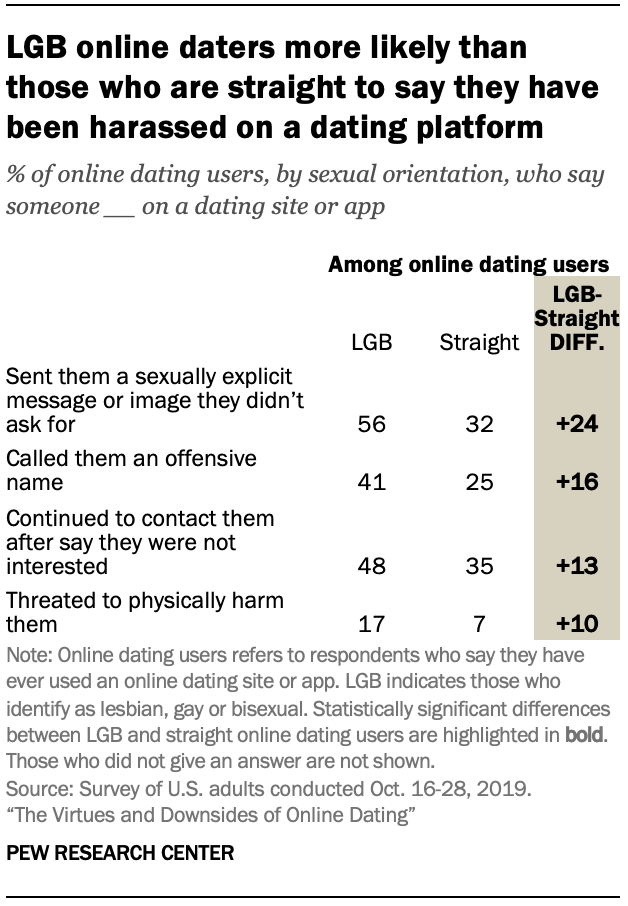 Whether someone reports that they have been the target of these behaviors also differs by sexual orientation. LGB users are more likely than straight users to say someone on a dating site or app has sent them a sexually explicit message or image they didn’t ask for (56% vs. 32%). LGB online daters also are more likely than straight users to say they’ve faced unwanted contact from someone after they said they were not interested, been called an offensive name or been physical threatened by someone on a dating site or app.
Whether someone reports that they have been the target of these behaviors also differs by sexual orientation. LGB users are more likely than straight users to say someone on a dating site or app has sent them a sexually explicit message or image they didn’t ask for (56% vs. 32%). LGB online daters also are more likely than straight users to say they’ve faced unwanted contact from someone after they said they were not interested, been called an offensive name or been physical threatened by someone on a dating site or app.


 Shareable facts about Americans' experiences with online dating
Shareable facts about Americans' experiences with online dating